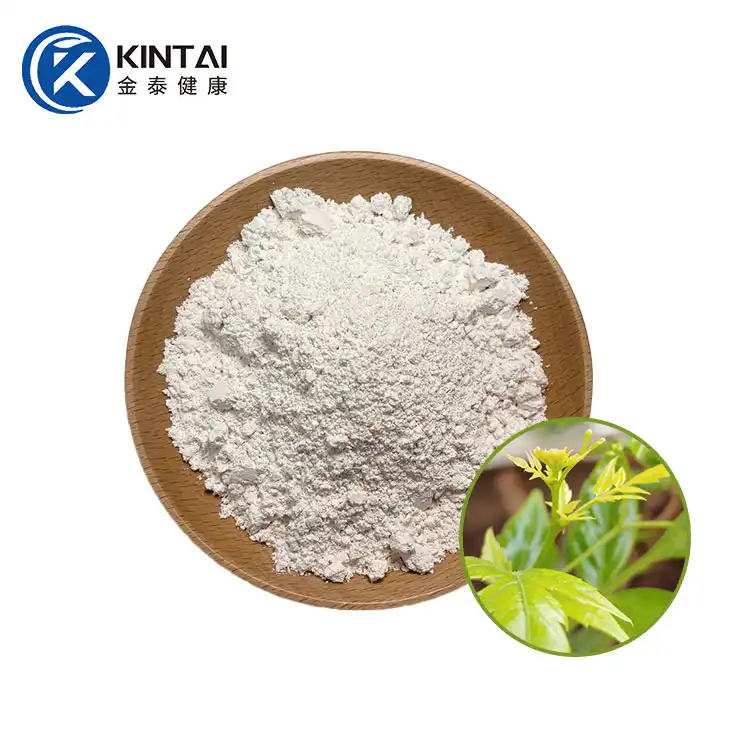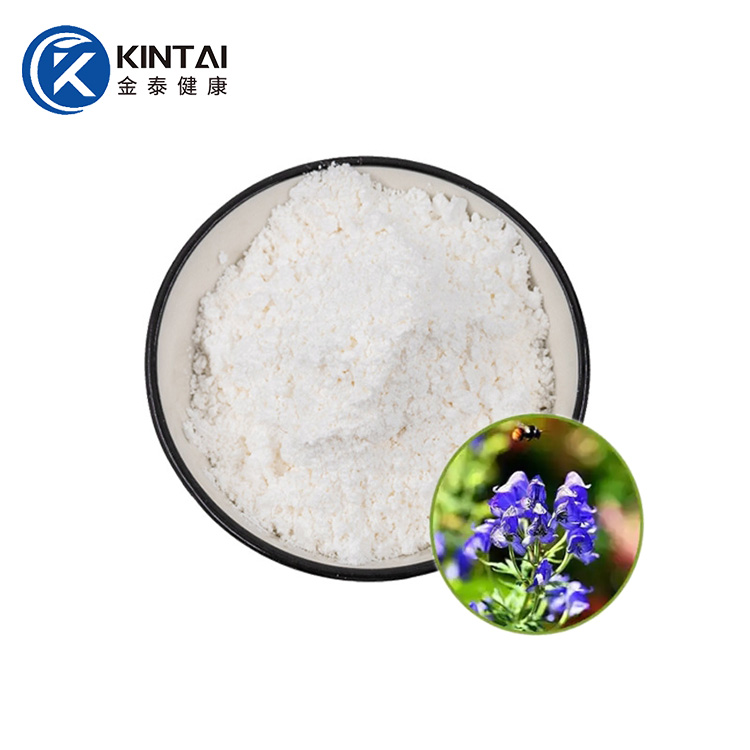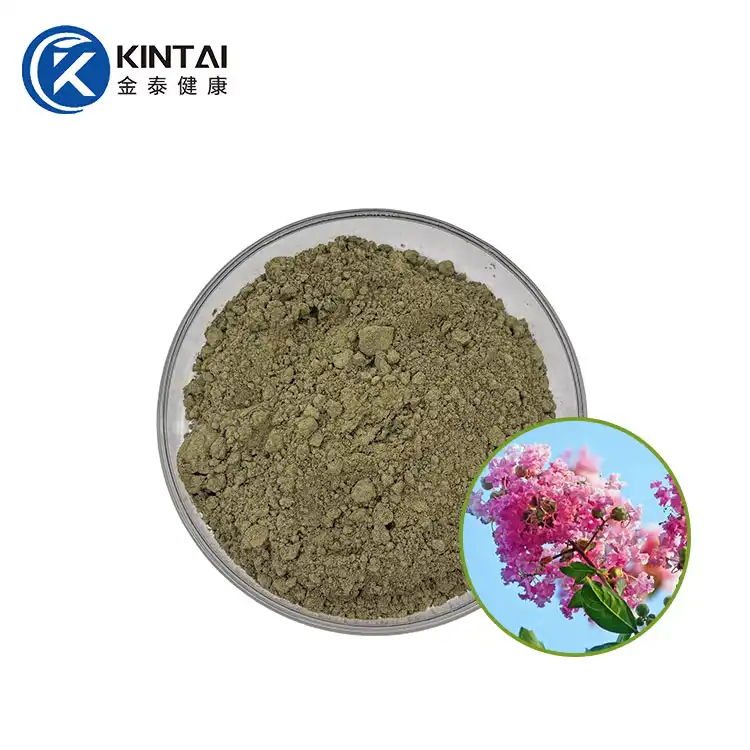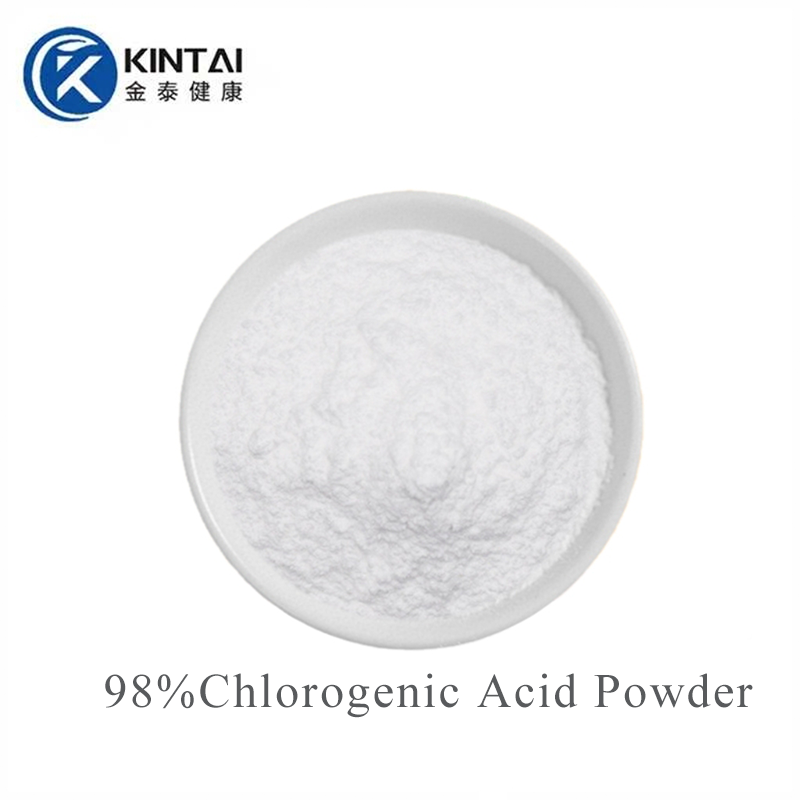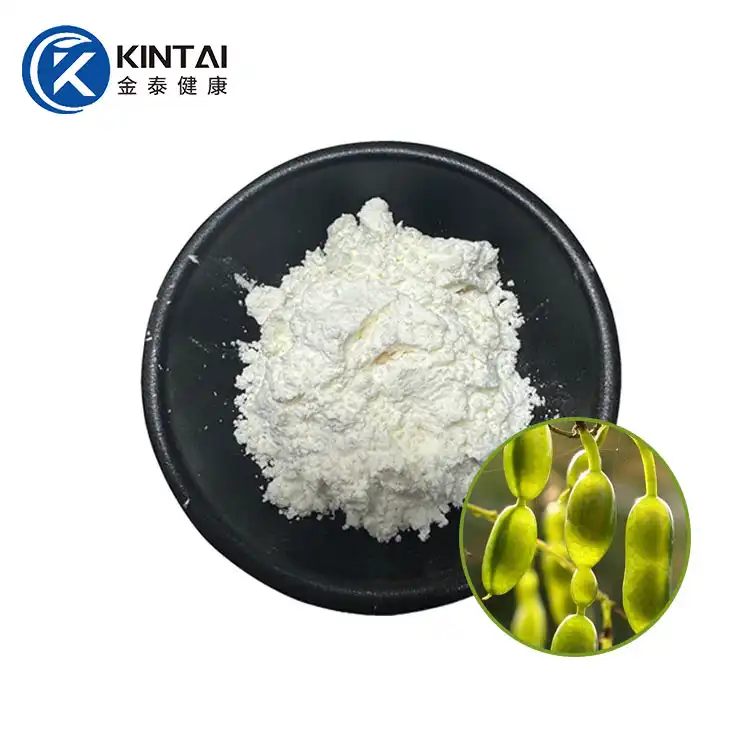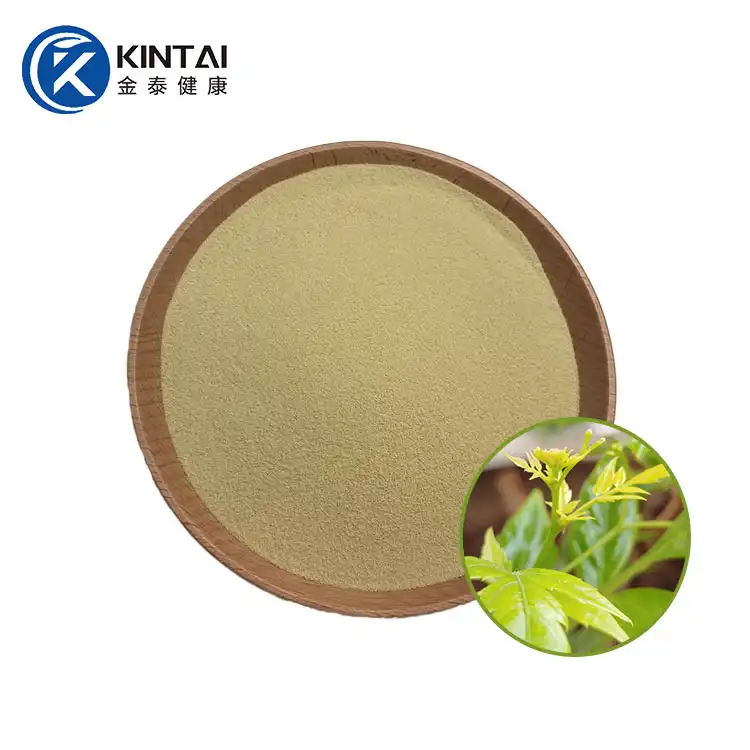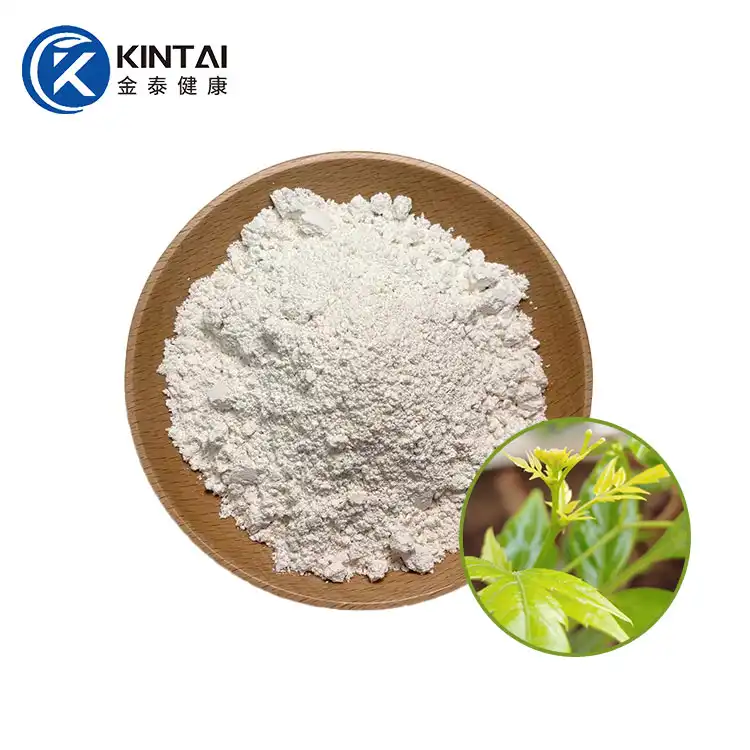Dihydromyricetin DMY
CAS No: 27200-12-0
Specification: 98% Dihydromyricetin
Appearance: white powder
Test Method: HPLC
Lead time: 1-3 days
Shelf Life: 2 years
Sample: Free sample available
Storage: Cool dry place and avoid light
Content: Vegan, Gluten-Free, Organic, Natural, Non-GMO, Non-additive
Certs: GMP, ISO9001:2015, ISO22000:2018, HACCP, KOSHER, HALAL
Payment: Multiple terms acceptable like T/T, LC, DA
KINTAI's Advantage: 100,000 level clean production workshop, Non-additive, Non-GMO, Non-Irradiated/treat by heat only.
- Fast Delievery
- Quality Assurance
- 24/7 Customer Service
Product Introduction
Dihydromyricetin DMY manufacturer
Dihydromyricetin is the main active ingredient of vine tea, also known as DHM\DMY, which has the effects of sobering up, protecting the liver, lowering blood sugar, anti-oxidation, anti-aging, and anti-fibrosis. As rattan tea is approved as a new resource food, dihydromyricetin has begun to be used in functional foods as a multi-directional functional raw material.
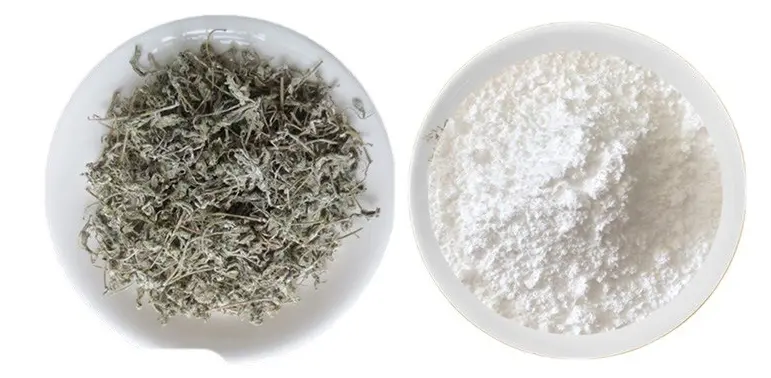
Kintai is a major Chinese manufacturer of dihydromyricetin. We currently have a large amount of dihydromyricetin for sale. We mainly produce 98% and 30% water-soluble DMY. Please contact us for customization of other contents. We have an experienced and professional R&D team, a complete quality assurance system, and produce and test in accordance with strict quality control standards. Contact us for more information at health@kintaibio.com.
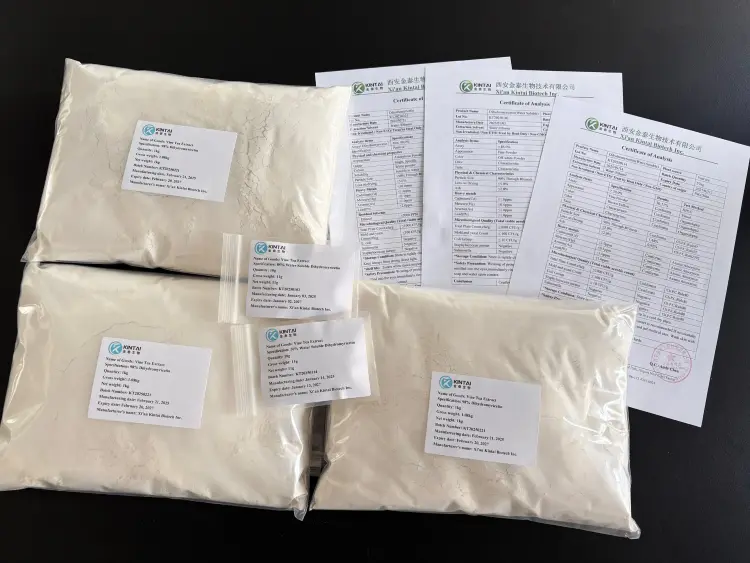
COA of DMY Powder
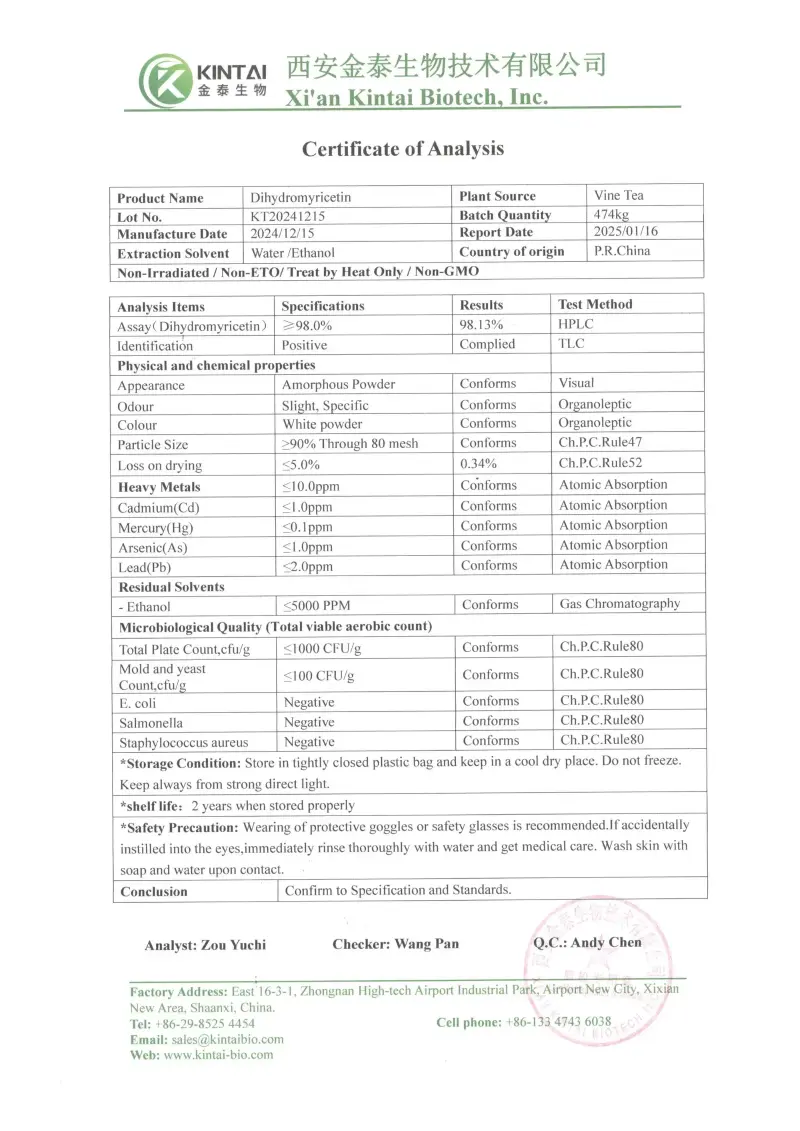
Physical&Chemical Properties of DMY
|
Property |
Description |
|
Chemical Name |
(2R,3R)-3,5,7-Trihydroxy-2-(3,4,5-trihydroxyphenyl)-2,3-dihydrochromen-4-one |
|
Synonyms |
Ampelopsin, DHM, vine tea Extract |
|
CAS Number |
27200-12-0 |
|
Molecular Weight |
320.25 g/mol |
|
Melting Point |
Decomposes at approximately 245-250 °C |
|
Solubility |
- Water: Slightly soluble |
|
Stability |
- Relatively stable under dry and dark conditions. |
|
Chemical Structure Type |
Dihydroflavonol (a flavanonol) |
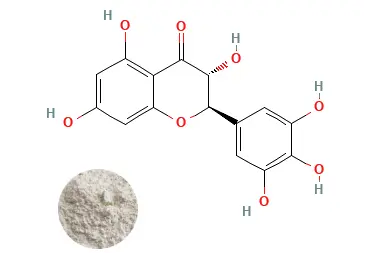
Sample available! Contact us now>>>
Dihydromyricetin for Hangovers
Drinking large amounts of alcohol in a short period of time can easily lead to acute alcohol poisoning, resulting in various symptoms such as dizziness, nausea, and vomiting. Acute alcohol poisoning has become one of the most common illnesses during holidays.
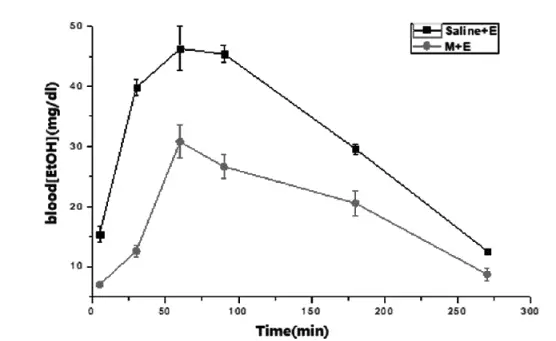
Dihydromyricetin , the primary flavonoid compound in rattan tea, has recently garnered widespread attention for its pharmacological effects. Previous studies have demonstrated that DHM exhibits multiple pharmacological activities, including antioxidant, anti-tumor, anti-inflammatory, anti-pathogenic, and lipid-regulating properties. Furthermore, DMY has been shown to alleviate ethanol intoxication and prevent alcoholic and fatty liver diseases.
(Reference:The Mechanism for Anti-drunk and Anti-inebriationn of Dihydromyricetin,Fang Qun, He Dongjun, Zhang Quan, He Wenjie, Wang Ting, Ye Jing)
Dihydromyricetin benefits
1. Liver Protection and Detoxification
Dihydromyricetin significantly enhances the activity of key enzymes in the liver's detoxification system (such as glutathione-S-transferase), accelerating the metabolism and excretion of harmful substances such as ethanol, heavy metals, and chemical toxins, thereby reducing the burden on the liver. Furthermore, it effectively inhibits excessive lipid accumulation in hepatocytes and, through its potent antioxidant properties, neutralizes free radical attacks on hepatocytes. This has clear protective and repairing effects on alcoholic fatty liver disease and chemical liver damage.
2. Blood Sugar Regulators
Dihydromyricetin exhibits a dual mechanism of action in regulating blood sugar. On the one hand, it protects pancreatic beta cells, improves their function, and promotes insulin secretion. On the other hand, it significantly increases the sensitivity of peripheral tissues (such as muscle and fat) to insulin, improving insulin resistance. Thus, it acts like a "key," facilitating smoother glucose entry and utilization in cells, effectively lowering fasting and postprandial blood sugar levels. This has positive implications for the prevention and management of type 2 diabetes.
3. Anti-inflammatory Effects
Dihydromyricetin effectively inhibits the production and release of various pro-inflammatory cytokines (such as TNF-α and IL-6) by regulating key inflammatory signaling pathways (such as the NF-κB and MAPK pathways). This fundamental regulation of inflammation results in its effective inhibitory effect on chronic low-grade inflammation, arthritis, and respiratory inflammation, helping to fundamentally alleviate various tissue damage and discomfort symptoms caused by inflammation.
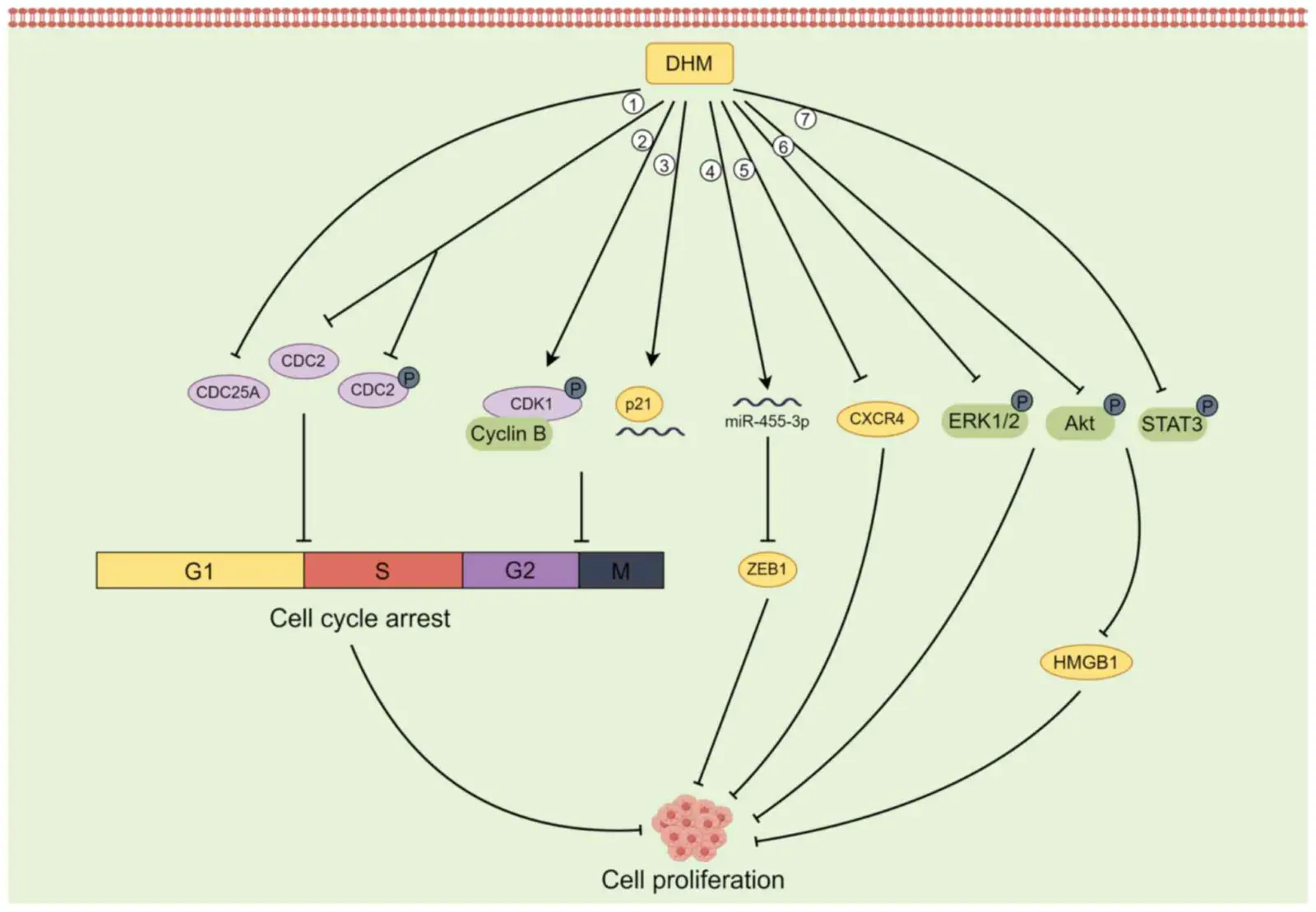
4. Anti-Aging
Its anti-aging benefits stem from a combination of actions. By reducing oxidative stress and chronic inflammation—two core drivers of cellular aging—dihydromyricetin helps protect telomeres, maintain mitochondrial function, and slow the aging process. Furthermore, it promotes collagen synthesis, helping maintain skin elasticity, combating aging from both intrinsic mechanisms and external manifestations.
5. Antioxidant Effects
Dihydromyricetin's molecular structure makes it a highly effective natural antioxidant. It directly neutralizes and scavenges excessive free radicals in the body, interrupting the chain reaction of oxidative damage they trigger. Its antioxidant capacity far exceeds that of vitamin C and vitamin E. Acting like a "scavenger" for the body, it protects cell membranes, proteins, and DNA from oxidative damage, maintaining cellular integrity and function.
6. Lipid Regulation and Cardiovascular Protection
In terms of lipid regulation, DMY can effectively lower serum levels of total cholesterol, triglycerides, and "bad" cholesterol (low-density lipoprotein cholesterol (LDL-C)), while simultaneously increasing "good" cholesterol (high-density lipoprotein cholesterol (HDL-C). By inhibiting intestinal absorption and endogenous synthesis of cholesterol and promoting its metabolism and excretion, it purifies the blood and prevents lipid deposition in blood vessel walls, thereby playing a key role in combating atherosclerosis and protecting cardiovascular health.
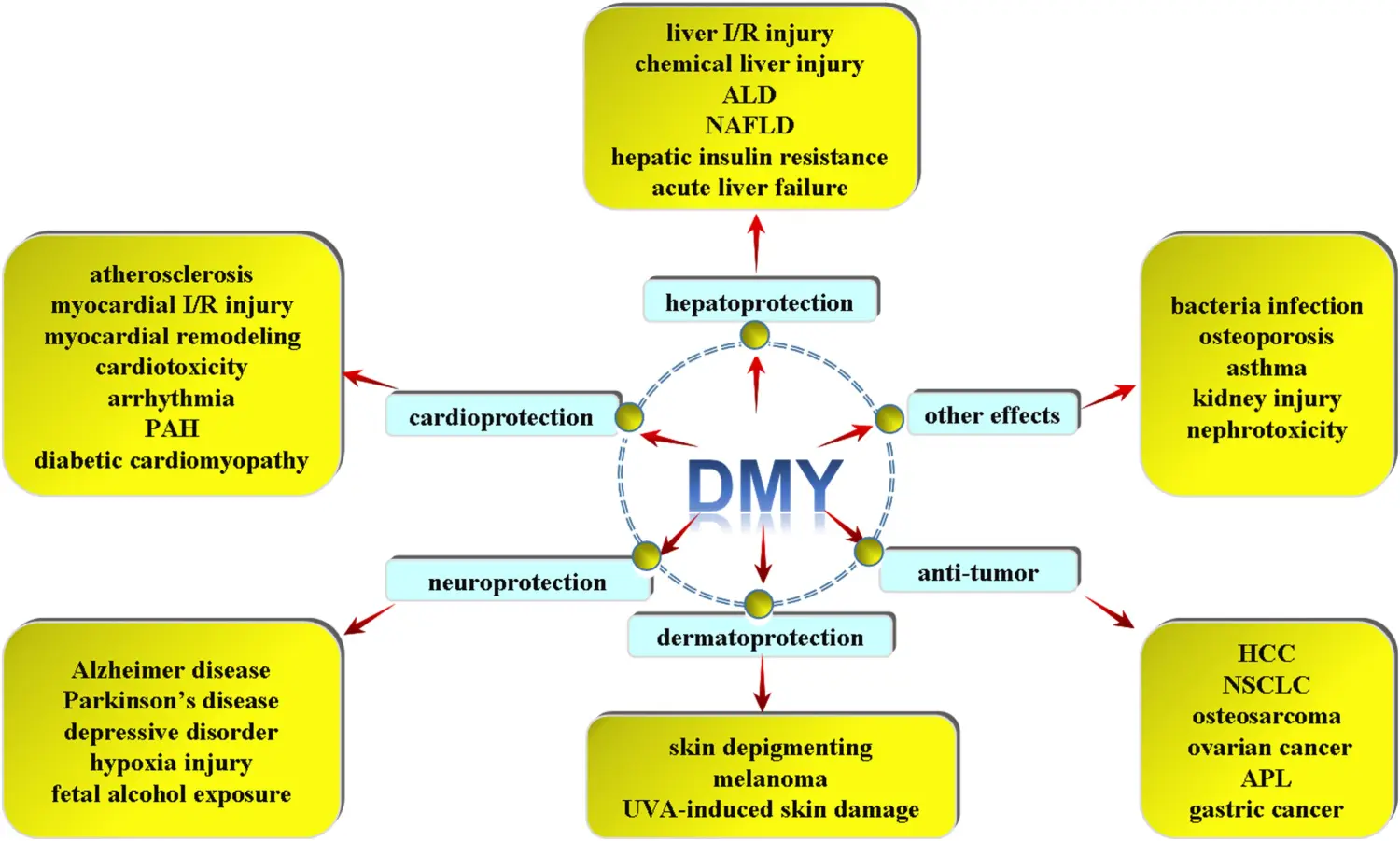
Dihydromyricetin Side Effects
1. Common Known or Potential Side Effects
When consumed normally with foods containing dihydromyricetin (such as vine tea) or supplements taken at recommended dosages, side effects are generally mild and may include:
- Gastrointestinal discomfort: This is the most common potential side effect. Some people may experience: Stomach discomfort, Nausea, Bloating
- Effects on Blood Sugar: Dihydromyricetin has been studied to help lower blood sugar. This may be beneficial for people with diabetes, but for those without diabetes or those taking antidiabetic medications, combined use with medications may cause hypoglycemia. Symptoms include dizziness, sweating, trembling, and fatigue.
- Effects on Blood Pressure: Similarly, it may have a modest blood pressure-lowering effect. Those taking antihypertensive medications should exercise caution to avoid hypotension.
2. Special Considerations and Risks
The following groups require extra caution when taking dihydromyricetin supplements and should consult a doctor first:
- Pregnant and breastfeeding women: There is currently insufficient human clinical research to confirm its safety for pregnant women and fetuses. Therefore, for safety reasons, women in this period are advised to avoid taking dihydromyricetin supplements.
- Children: Safety has not yet been established, and children are not recommended to take it casually.
- Individuals with severe liver and kidney dysfunction: Although dihydromyricetin itself may have a protective effect on the liver, individuals with pre-existing liver and kidney disease have a reduced ability to metabolize and eliminate substances. Any supplement should be used with extreme caution and only under the guidance of a doctor.
- People taking certain medications:Glycemic-lowering drugs (such as insulin and metformin), antihypertensive drugs, anticoagulants/antiplatelet drugs (such as warfarin, aspirin, clopidogrel), and drugs metabolized by the liver.
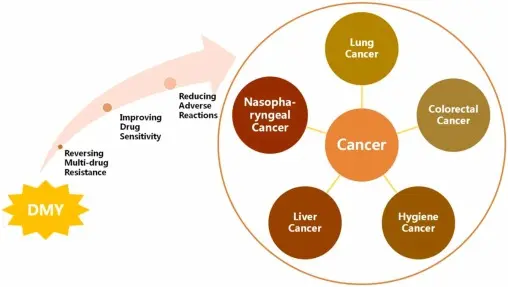
Why Choose KINTAI DMY?
- Complete qualifications: The DMY powder produced by KINTAI has also passed third-party testing for important indicators such as heavy metals, aflatoxin, and solvent residues.
- High quality: Professional R&D and production teams bring high-purity, high-quality dihydromyricetin powder
- Safe source: Our dihydromyricetin comes from natural Vine tea, and we control the source to ensure that the extract is not contaminated.
- High-quality service: With customer needs as the core, we provide accurate pre-sales consultation, professional one-to-one communication, and high-quality after-sales service.
Our Certifications
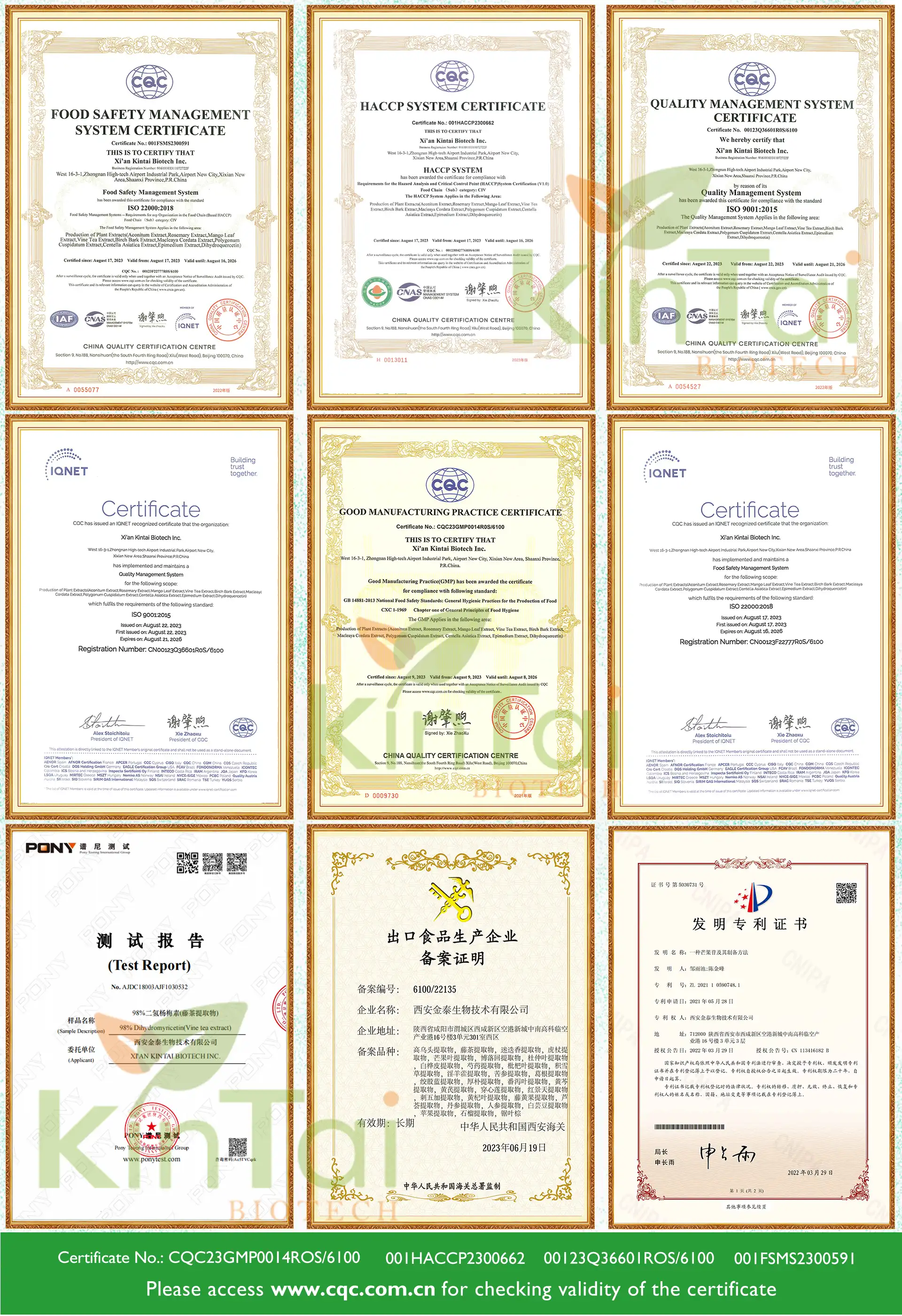
Send Inquiry
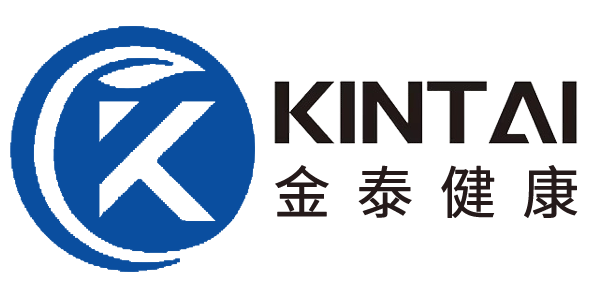
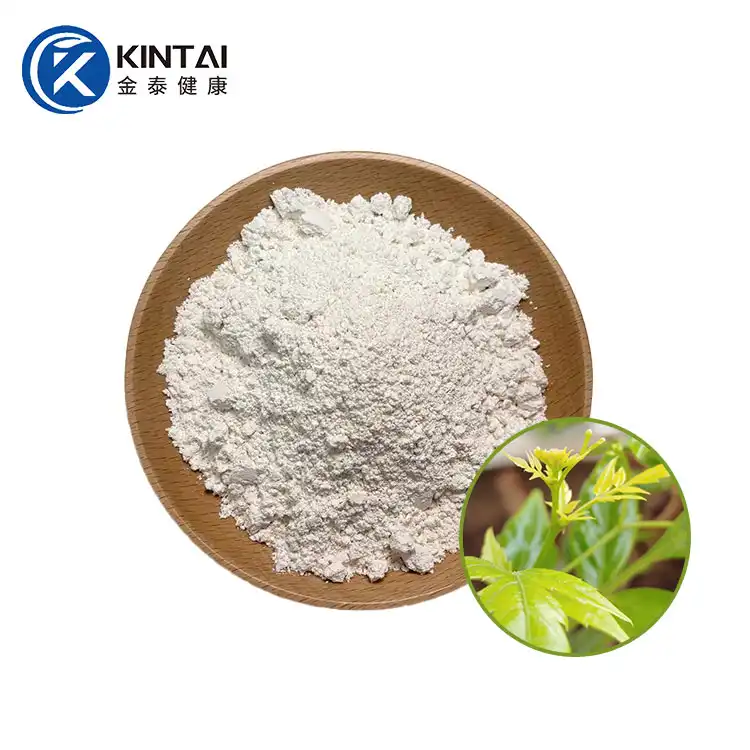
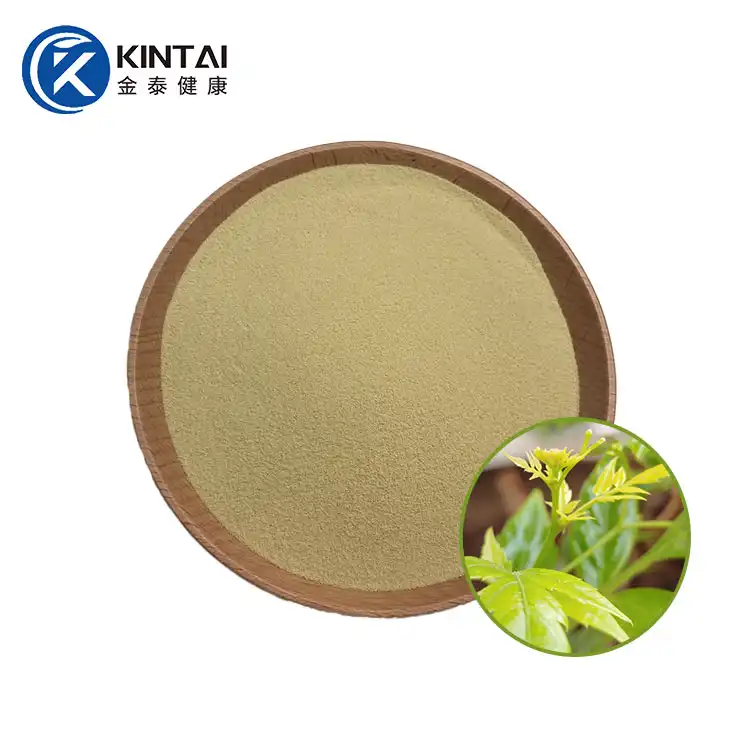
_1760933994683.jpg)
